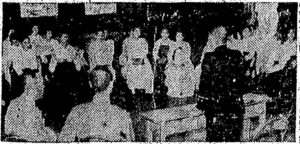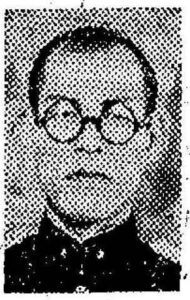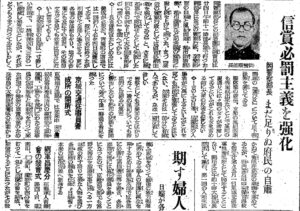The modern Seoul police as an organization descends directly from the Imperial Japanese colonial police forces which policed the Korean population during the colonial period. In recent days, we have seen some things about the modern Seoul police which may possibly be attributable to this institutional legacy, such as its strong conservative political orientation (to the point of acting to shield the Yoon government from responsibility for the Itaewon Halloween crowd crush), and its prioritization of monitoring crime over crowd control.
Indeed, it could be argued that institutional continuity with Imperial Japanese institutions ensures that some cultural attributes from Imperial Japan are difficult to erase from the police force, despite years democratic liberalization and reform. To explore this further, I'm sharing two articles, one from 1943 and another from 1944, which give us a glimpse into what Seoul police culture was like during the colonial period.
But before I delve into the articles, here is a passage from p. 38 of The Korean War by Max Hastings to provide additional context:
The suspicions of many Korean Nationalists about the conduct of the American military government were redoubled by the fashion in which the National Police, the most detested instrument of Japanese tyranny, was not merely retained but strengthened. It was the American official historians of the occupation who wrote that "the Japanese police in Korea possessed a breadth of function and an extent of power equalled in few countries in the modern world." The 12,000 Japanese in their ranks were sent home. But the 8,000 Koreans who remained—the loyal servants of a brutal tyranny in which torture and judicial murder had been basic instruments of government—found themselves promoted to fill the higher ranks, while total police strength in South Korea doubled. Equipped with American arms, jeeps, and radio communications, the police became the major enforcement arm of American military government and its chief source of political intelligence. A man like Yi Ku-bom, one of the most notorious police officers of the Japanese regime, who feared for his life in August 1945, was a year later chief of a major ward station in Seoul. A long roll call of prominent torturers and anti-Nationalist fighters under the colonial power found themselves in positions of unprecedented authority. In 1948, 53 percent of officers and 25 percent of rank-and-file police were Japanese-trained. By a supreme irony, when the development began of a Constabulary force, from which the South Korean Army would grow, the Americans specifically excluded any recruit who had been imprisoned by the Japanese—and thus any member of the anti-Japanese resistance. The first chief of staff of the South Korean Army in 1947 was a former colonel in the Japanese Army.
(Translation)
Gyeongseong Ilbo (Keijo Nippo) August 13, 1943
Vowing to unite the people and the police
Patriotic group leaders hold roundtable discussion
"Recently, the leaders of the town council have not been well educated. We would like to have more qualified people on board". "It's a little too much to ask a female patriotic group member to work a night patrol position". These were the first words uttered by the people at the "Urban Police Roundtable Discussion" organized by the Jongno Police Station, which was held to listen to the honest opinions of the fighting people of Seoul, to promote the unity of the police and the people, and to stabilize the lives of the people. The police station held the round-table discussion to listen to the voices of the fighting people at Whimoon National School in Anguk-dong, Jongno-gu from 2:00 p.m. on August 12, inviting more than 50 leaders from the patriotic groups and town councils in the area.

Following the national State Shinto ceremonies, Director Sano gave the following admonition: "We cannot win the Greater East Asia War unless the police who serve as the eyes and ears, and the people who serve as the hands and feet, completely fuse together and raise up all their strength". The High Police Commissioner Okamura issued a warning regarding counterintelligence, irresponsible rumors, and fabricated lies. After this, they moved on to the round-table discussion session, where they frankly exchanged opinions on an open and friendly basis.
The people's voices exploded incessantly trying to clearly express their feelings, with many people sharing their candid opinions, such as "The police officers do not show enough humanity towards the people as things are now," and "We want more sincerity from our leaders". The meeting was adjourned after 4:00 p.m., with the participants firmly pledging to work together as one for a concerted effort on the home front.
The roundtable discussion meetings will be held in each district (gu) until the end of September, and from now on, the Urban Police Roundtable Discussions will be held every Thursday and Saturday in order to listen to the voices of the people and to strengthen home front security.
Photo: at the round-table discussion
Source: https://www.archive.org/details/kjnp-1943-08-13
Gyeongseong Ilbo (Keijo Nippo) April 25, 1944
Reinforcing the principle of "trust, reward, and punishment"
Police Chief Oka: "Still Not Enough Self-Restraint by the People of Seoul"
The regular press conference with Police Chief Oka was held at 11:00 a.m. on April 24 in his office. Oka gave examples of recent police administration, self-restraint and public morals at entertainment venues, urban defense measures, and urban evacuation plans in response to questions from the press. First, he praised Sergeant Otani's "pure heart," citing the example of a man from the underworld who tried unsuccessfully to bribe the police in the cotton cloth case, and then said, "Recently, the police administration has been strengthening the principle of trust, reward, and punishment."
 |
| Police Chief Oka |
◇...To produce good police officers, training is need. At the dōjō (military-style training center) in Aobachō, about 80 people are trained at a time for four days. Six hundred have already completed the training, but we will continue until all of them have participated. We are also planning to have the executive level officers of each police station participate in the training, and to extend the training to all local police stations. We can say that the effectiveness of the training is close to 100%, judging from the feedback that we have received from the participants.
◇... Enforcing self-restraint is a very difficult problem. The first-class restaurants were reduced in size by one-third to become smaller counter-style restaurants, but this has not been going well. We are working on a solution to the problem of 'carrying women'. The problem of the public morals with respect to laid-off and unemployed kisaeng and female waitresses cannot be ignored. The number of "women of the underworld" in the back streets of certain districts is said to be increasing dramatically, but before blaming the women, we would like to urge the public to reflect on this issue as well.
◇...The number of visitors to Changgyeonggung on Sunday was said to have reached 60,000, so we cannot say that the people of Seoul are restrained. Of course, these leisure seekers may be representing only a small portion of the population, but I would like the public to reflect on this issue more.
The police are determined to thoroughly crack down not only on women at entertainment venues, but also on offenses against public morals in general. After this admonition, Police Chief Oka spoke about urban defense measures and urban evacuation plans, and the press conference ended shortly after 1:00 p.m.
Source: https://www.archive.org/details/kjnp-1944-04-25
(Notes)
Patriotic Groups (JP: aikoku-han, KR: aeguk-ban, 愛國班) were neighborhood cells which functioned as the local arm of the Korean Federation of National Power (国民総力朝鮮連盟, 국민총력조선연맹), the single ruling party of colonial Korea. Every Korean living in Korea belonged to a Patriotic Group. It typically consisted of a few households, led by a Patriotic Group leader, who normally acted as a mini-tyrant micromanaging the lives of everyone within the Patriotic Group. That included things like rationing food and goods, enforcing mandatory State Shinto prayer times and shrine visits, ‘volunteering’ laborers upon the colonial government’s request, arranging marriages, holding mandatory Japanese language classes, spying on ‘ideological criminals’, etc.
See also: The Korean War by Max Hastings, available on the Internet Archive.
(Transcription)
京城日報 1943年8月13日
警民一体を誓う
愛国班長座談会開く
”最近の町会指導員は教養が足らない。もう少し有資格者を置いてもらいたい””女の班員に夜警をやらせることは少し無理です”これは戦う府民の懐に飛び込んで民衆の率直な声を聞いて警民一体の実を挙げるとともに国民生活の安定を図ろうとする鐘路警察署主催の”都市警察座談会”に於ける民衆の第一声だった。同署では十二日午後二時から鐘路区安国町徽文国民学校に同地区の愛国班長以上町会役員約五十余名を召集して決戦国民の声を聞く座談会を開いた。
国民儀礼に次いで佐野所長から”目と耳として働く警察と手と足となって働く民衆とが完全融合して総力を挙げねば大東亜戦を勝ち抜くことは出来ない”との訓示あって岡村高等主任から防諜並びに造言蜚語に関する注意あったのち座談会に移り、膝を交えて忌憚なき意見の交換を遂げた。
きょうこそ我々の気持ちをはっきりと告げようとばかり民衆の声は引きも切らず爆発され、”警察官は民衆に対する人情味がいまのままでは物足りぬ””指導者の誠意がもっともっと欲しい”等々の民意を率直に漏らし、銃後一丸となって総力運動に挺身することを固く誓って同四時すぎ閉会した。
なお同座談会は九月末日まで各地区別に行われる筈であるが、今後は毎週木、土曜を都市座談会日と定め民衆の声を聞いて銃後治安の強化を図る。
【写真=その座談会】
京城日報 1944年4月25日
信賞必罰主義を強化
岡警察部長:まだ足りぬ府民の自粛
岡警察部長との記者団定例会見は二十四日午前十一時部長室で行った。岡部長は最近の警察行政、享楽部面の自粛と風紀問題、都市防衛態勢、都市疎開など記者団の質問に対し例を上げて語った。まず『最近の警察行政としては信賞必罰主義を強化している』と、さきに綿布事件で贈賄せんとして失敗した闇の男の例を上げて大谷巡査部長の『清い心』を讃えてから、
◇...良き警察官たらしめるには錬成が必要だ。青葉町の道場では一回約八十名を四日宛錬成している。既に六百名は終ったが引き続けて全部入場させる。更に各署の幹部級もやり、地方の各署にも及ぼす心算だ。その感想文などを見ても効果は百%に近いと言ってもよい。
◇...享楽部面の自粛は一寸難しい問題で、一流料理店を三分の一に縮減し割烹店としたが、それがどうもうまく行っていないらしく、問題の『運び女』について目下善後策を講じている。廃休業の妓生、女給の風紀問題も等関視出来ないことで某町の裏通りには”闇の女”が激増しているというが、これも女を責める前に大衆の反省を促したい。
◇...きのうの日曜、昌慶苑の入場者が六万に上るというが、これを見ても府民が緊張しているとはいえない。勿論それは一部分の有閑人であろうが、なお一層反省して欲しい。
警察としても享楽面の女ばかりでなく、一般の風紀についても徹底的に取り締まる心算だ、と警告したのち都市の防衛と疎開について述べ午後一時過ぎ会見を終った。






No comments:
Post a Comment